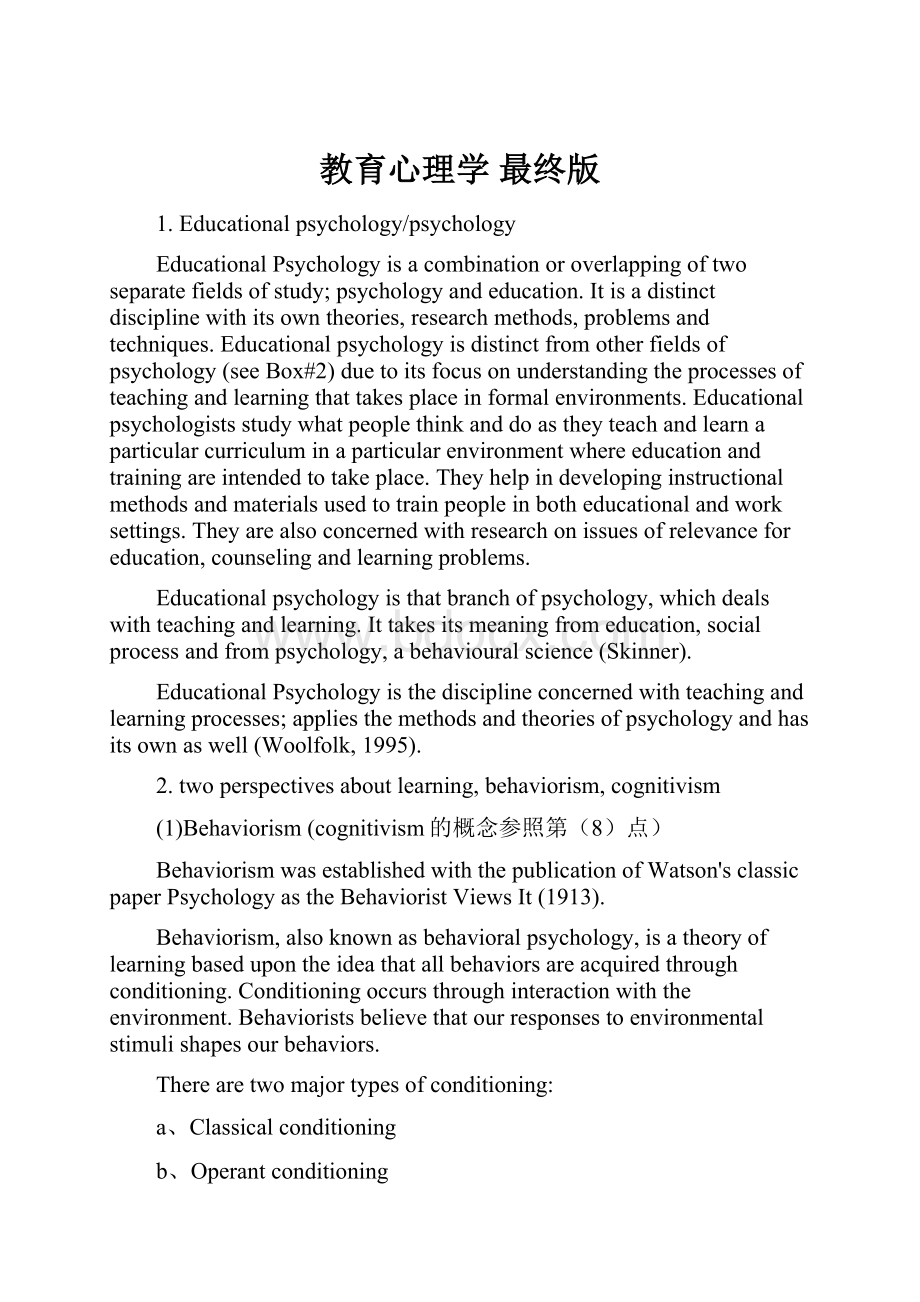教育心理学 最终版.docx
《教育心理学 最终版.docx》由会员分享,可在线阅读,更多相关《教育心理学 最终版.docx(24页珍藏版)》请在冰豆网上搜索。

教育心理学最终版
1.Educationalpsychology/psychology
EducationalPsychologyisacombinationoroverlappingoftwoseparatefieldsofstudy;psychologyandeducation.Itisadistinctdisciplinewithitsowntheories,researchmethods,problemsandtechniques.Educationalpsychologyisdistinctfromotherfieldsofpsychology(seeBox#2)duetoitsfocusonunderstandingtheprocessesofteachingandlearningthattakesplaceinformalenvironments.Educationalpsychologistsstudywhatpeoplethinkanddoastheyteachandlearnaparticularcurriculuminaparticularenvironmentwhereeducationandtrainingareintendedtotakeplace.Theyhelpindevelopinginstructionalmethodsandmaterialsusedtotrainpeopleinbotheducationalandworksettings.Theyarealsoconcernedwithresearchonissuesofrelevanceforeducation,counselingandlearningproblems.
Educationalpsychologyisthatbranchofpsychology,whichdealswithteachingandlearning.Ittakesitsmeaningfromeducation,socialprocessandfrompsychology,abehaviouralscience(Skinner).
EducationalPsychologyisthedisciplineconcernedwithteachingandlearningprocesses;appliesthemethodsandtheoriesofpsychologyandhasitsownaswell(Woolfolk,1995).
2.twoperspectivesaboutlearning,behaviorism,cognitivism
(1)Behaviorism(cognitivism的概念参照第(8)点)
BehaviorismwasestablishedwiththepublicationofWatson'sclassicpaperPsychologyastheBehavioristViewsIt(1913).
Behaviorism,alsoknownasbehavioralpsychology,isatheoryoflearningbasedupontheideathatallbehaviorsareacquiredthroughconditioning.Conditioningoccursthroughinteractionwiththeenvironment.Behavioristsbelievethatourresponsestoenvironmentalstimulishapesourbehaviors.
Therearetwomajortypesofconditioning:
a、Classicalconditioning
b、Operantconditioning
(2)ClassicalConditioning(Pavlov)
Classicalconditioningisareflexiveorautomatictypeoflearninginwhichastimulusacquiresthecapacitytoevokearesponsethatwasoriginallyevokedbyanotherstimulus.
Severaltypesoflearningexist.Themostbasicformisassociativelearning,i.e.,makinganewassociationbetweeneventsintheenvironment.Therearetwoformsofassociativelearning:
classicalconditioning(madefamousbyIvanPavlov’sexperimentswithdogs)andoperantconditioning.
(3)OperantConditioning(Skinner)
Abehavioristtheorybasedonthefundamentalideathatbehaviorsthatarereinforcedwilltendtocontinue,whilebehaviorsthatarepunishedwilleventuallyend.
Operantconditioningcanbedescribedasaprocessthatattemptstomodifybehaviorthroughtheuseofpositiveandnegativereinforcement.Throughoperantconditioning,anindividualmakesanassociationbetweenaparticularbehaviorandaconsequence.
(4)UnconditionedResponse:
Inclassicalconditioning,theunconditionedresponseistheunlearnedresponsethatoccursnaturallyinresponsetotheunconditionedstimulus.Forexample,ifthesmelloffoodistheunconditionedstimulus,thefeelingofhungerinresponsetothesmelloffoodistheunconditionedresponse.
(5)conditionedResponse:
Inclassicalconditioning,theconditionedresponseisthelearnedresponsetothepreviouslyneutralstimulus.Forexample,let'ssupposethatthesmelloffoodisanunconditionedstimulus,afeelingofhungerinresponsethethesmellisaunconditionedresponse,andathesoundofawhistleistheconditionedstimulus.Theconditionedresponsewouldbefeelinghungrywhenyouheardthesoundofthewhistle.
(6)operantconditioning
∙Operantconditioning(sometimesreferredtoasinstrumentalconditioning)isamethodoflearningthatoccursthroughrewardsandpunishmentsforbehavior.Throughoperantconditioning,anassociationismadebetweenabehaviorandaconsequenceforthatbehavior.Example1:
Parentsrewardingachild’sexcellentgradeswithcandyorsomeotherprize.
∙Example2:
Aschoolteacherawardspointstothosestudentswhoarethemostcalmandwell-behaved.Studentseventuallyrealizethatwhentheyvoluntarilybecomequieterandbetterbehaved,thattheyearnmorepoints.
(7)Advantages
Behavioristlearningprinciplesbenefitchildrenwithlearningdisabilities,byapproachingnotonlylearningissues,butbehavioralissuesaswell.Theseteachingmethodsworkbestonsubjectsthatrequirestudentstomemorizefacts,suchashistory,socialstudiesandmathematics.Thebehavioristapproachtolearningalsoinvolvesbreakingdownlargeskillsetsintosmaller,moremanageableskills.Thisallowsstudentstomasterconceptsbeforemovingtothenextskillset.Forexample,teachersbreakdownphonicsintoindividuallettersoundsbeforemovingtomoreadvancedconcepts.
∙Disadvantages
Sometimespositivereinforcementbackfires.Childrenmightbecomereliantonrewardsfordesiredbehaviors.Teacherscancounteractthisbyreducingrewardswhenthechildbeginstodisplaythedesiredbehavior.Behaviorismalsodoesn'tworkwellforallsubjects.Conceptssuchaswriting,whichrequiresstudentstoanalyzeandinterpretinformation,mightnotbenefitfromthebehavioristapproach.
(8)Cognitivismisthetheorythathumansgenerateknowledgeandmeaningthroughsequentialdevelopmentofanindividual’scognitiveabilities,suchasthementalprocessesofrecognize,recall,analyze,reflect,apply,create,understand,andevaluate.
(9)Piagettheory---cognitivestages;
JeanPiagetdevelopedthetheoryofcognitivedevelopment.Thetheorystatedthatintelligencedevelopedinfourdifferentstages.
1)thesensorimotorstagefrombirthto2yearsold,
2)thepreoperationalstatefrom2yearsoldto7yearsold,
3)theconcreteoperationalstagefrom7yearsoldto10yearsold
4)theformaloperationalstagefrom11yearsoldandup.
(10)Brunertheory—discoverylearning;
JeromeBrunerwasthefirsttoapplythecognitiveapproachesineducationalpsychology.HewastheonewhointroducedtheideasofJeanPiagetintoeducationalpsychology.Headvocatedfordiscoverylearningwhereteacherscreateaproblemsolvingenvironmentthatallowsthestudenttoquestion,exploreandexperiment.
(11)Vygotskytheory—proximaldevelopmentzone;
PsychologistLevVygotskyproposedthatchildrenlearnthroughinteractionswiththeirsurroundingculture.Thistheory,knownasthesocio-culturalperspective,statesthatthecognitivedevelopmentofchildrenandadolescentsisenhancedwhentheyworkintheirZoneofProximalDevelopment(ZPDforshort).ToreachtheZPD,childrenneedthehelpofadultsormorecompetentindividualstosupportorscaffoldthemastheyarelearningnewthings.
AccordingtoVygotsky'stheory,childrencandomorewiththehelpandguidanceofanadultorotherpersonmoreexperiencedpersonthantheycandobythemselves.TheZoneofProximalDevelopmentdefinesskillsandabilitiesthatareintheprocessofdeveloping.TheZPDistherangeoftasksthatonecannotyetperformindependently,butcanaccomplishwiththehelpofamorecompetentindividual.Forexample,achildmightnotbeabletowalkacrossabalancebeamonherown,butshecandosowhileholdinghermother'shand.Sincechildrenarealwayslearningnewthings,theZPDchangesasnewskillsareacquired.
(12)Bandura---ModelingIndicatorsforcognitivedevelopment
Bandurahasconductedmanystudiesinvolvingobservationallearning,ormodeling.Themodelingprocessincludesseveralsteps:
1)Attention-Inorderforanindividualtolearnanything,heorshemustpayattentiontothefeaturesofthemodeledbehavior.Manyfactorscontributetotheamountofattentiononepaystothemodeledactivities,suchasthecharacteristicsofboththeobserverandthepersonbeingobservedandcompetingstimuli.
2)Retention-Ifanindividualistobeinfluencedbyobservingbehaviorsheorsheneedstoremembertheactivitiesthatweremodeledatonetimeoranother.Imageryandlanguageaidinthisprocessofretaininginformation.Humansstorethebehaviorstheyobserveintheformofmentalimagesorverbaldescriptions,andarethenabletorecalltheimageordescriptionlatertoreproducetheactivitywiththeirownbehavior.
3)Reproduction-Reproductioninvolvesconvertingsymbolicrepresentationsintoappropriateactions.Behavioralreproductionisaccomplishedbyorganizingone'sownresponsesinaccordancewiththemodeledpattern.Aperson'sabilitytoreproduceabehaviorimproveswithpractice.
4)Motivation-Toimitateabehavior,thepersonmusthavesomemotivatingfactorbehindit,suchasincentivesthatapersonenvisions.Theseimaginedincentivesactasreinforcers.Negativereinforcersdiscouragethecontinuationofthemodeledactivity.
3.①Whatismotivation?
Motivationisdefinedasaninternaldrivethatactivatesbehaviorandgivesitdirection.Thetermmotivationtheoryisconcernedwiththeprocessesthatdescribewhyandhowhumanbehaviorisactivatedanddirected”(Romando,2007,para.1).
Theprocessesthataccountforanindividual’sintensity,direction,andpersistenceofefforttowardattainingagoal
KeyElements
①Intensity:
howhardapersontries
②Direction:
towardbeneficialgoal
③Persistence:
howlongapersontries
Componentsofmotivation
Directionrelatestowhatanindividualchoosestodowhenpresentedwithanumberofalternatives
Intensityreferstothestrengthofresponseoncethealternativeischosen
Persistencereferstothestayingpowerofbehaviororhowlongapersonwillcontinuetodevoteeffort
②Maslow’sHierarchyofNeeds
Maslow'shierarchyofneedsisatheoryinpsychology,proposedbyAbrahamMaslowinhis1943paperATheoryofHumanMotivation.Maslowlaterextendedtheideatoincludehisobservationsofhumans'innatecuriosity.Histheorieslinkwithmanyothertheoriesofhu